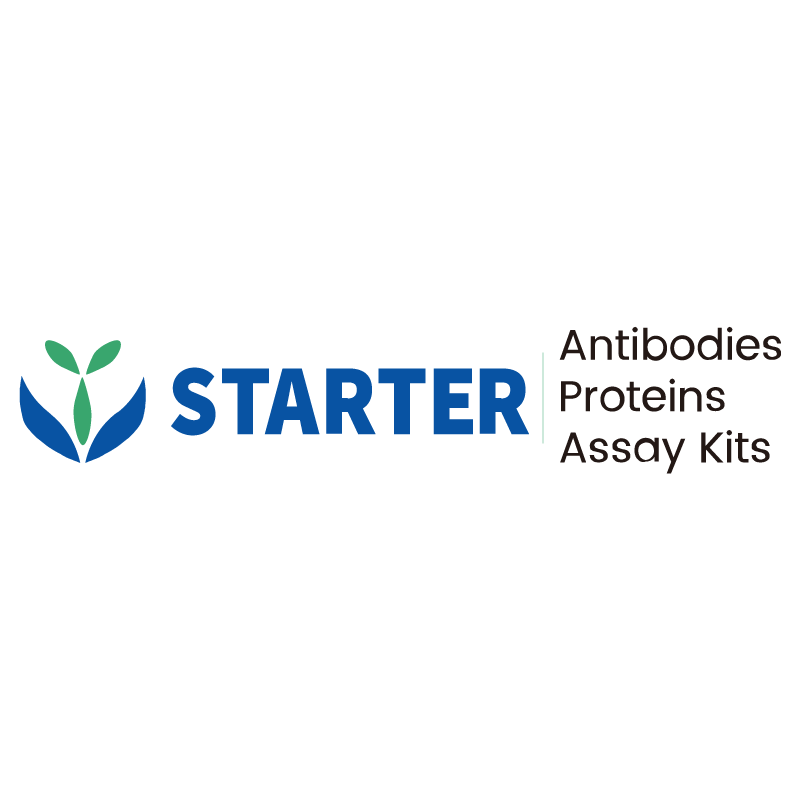WB result of FGFR2b Rabbit mAb Primary antibody: FGFR2b Rabbit mAb at 1/1000 dilution Lane 1: SW620 whole cell lysate 20 µg Lane 2: KATO III whole cell lysate 20 µg Negative control: SW620 whole cell lysate Secondary antibody: Goat Anti-Rabbit IgG, (H+L), HRP conjugated at 1/10000 dilution Predicted MW: 92 kDa Observed MW: 92, 145 kDa
Product Details
Product Details
Product Specification
| Host | Rabbit |
| Antigen | FGFR2b |
| Synonyms | FGFR2IIIb, Fibroblast growth factor receptor 2b, Fibroblast growth factor receptor 2IIIb |
| Immunogen | Synthetic Peptide |
| Location | Secreted, Cell membrane |
| Accession | P21802-3 |
| Clone Number | SDT-423-2 |
| Antibody Type | Recombinant mAb |
| Application | WB, IHC-P, FCM |
| Reactivity | Hu |
| Purification | Protein A |
| Concentration | 0.5 mg/ml |
| Conjugation | Unconjugated |
| Physical Appearance | Liquid |
| Storage Buffer | PBS, 40% Glycerol, 0.05%BSA, 0.03% Proclin 300 |
| Stability & Storage | 12 months from date of receipt / reconstitution, -20 °C as supplied |
Dilution
| application | dilution | species |
| WB | 1:1000 | null |
| IHC | 1:500 | null |
| FCM | 1:50 | null |
Background
FGFR2b is a member of the fibroblast growth factor receptor family, where amino acid sequence is highly conserved between members and throughout evolution. The extracellular portion of the protein interacts with fibroblast growth factors, setting in motion a cascade of downstream signals, ultimately influencing mitogenesis and differentiation. FGFR2b has important roles in embryonic development and tissue repair, especially bone and blood vessels. Recent studies have found that about 30% of patients overexpress FGFR2b protein, which may be used as a new biomarker and research target for gastric cancer.
Picture
Picture
Western Blot
WB result of FGFR2b Rabbit mAb Primary antibody: FGFR2b Rabbit mAb at 1/1000 dilution Lane 1: 293T transfected with FGFR2c whole cell lysate 20 µg (Uniprot: P21802-1) Lane 1: 293T transfected with FGFR2b whole cell lysate 20 µg (Uniprot: P21802-3) Secondary antibody: Goat Anti-Rabbit IgG, (H+L), HRP conjugated at 1/10000 dilution Predicted MW: 92 kDa Observed MW: 92~145 kDa
WB result of FGFR2b Rabbit mAb Primary antibody: FGFR2b Rabbit mAb at 1/1000 dilution Lane 1: recombinant human FGFR4 protein 10 ng (CAT. NO. UA020009) Lane 2: recombinant human FGFR3 protein 10 ng Lane 3: recombinant human FGFR1 protein 10 ng (CAT. NO. UA020008) Lane 4: recombinant human FGFR2c protein 10 ng (UniProt: P21802-1) Lane 5: recombinant human FGFR2b protein 10 ng (CAT. NO. UA010145) Secondary antibody: Goat Anti-Rabbit IgG, (H+L), HRP conjugated at 1/10000 dilution Predicted MW: 92 kDa Observed MW: 41~60 kDa
FC
Flow cytometric analysis of SW620 (Human colorectal adenocarcinoma epithelial cell, left) / KATO III (human gastric carcinoma, right) cells labelling FGFR2b antibody at 1/50 dilution (1 μg) / (red) compared with a Rabbit monoclonal IgG (Black) isotype control and an unlabelled control (cells without incubation with primary antibody and secondary antibody) (Blue). Goat Anti - Rabbit IgG Alexa Fluor 647 was used as the secondary antibody. Negative control: SW620
Immunohistochemistry
IHC shows positive staining in paraffin-embedded human gastric cancer. Anti- FGFR2b antibody was used at 1/500 dilution, followed by a HRP Polymer for Mouse & Rabbit IgG (ready to use). Counterstained with hematoxylin. Heat mediated antigen retrieval with Tris/EDTA buffer pH9.0 was performed before commencing with IHC staining protocol.
Negative control: IHC shows negative staining in paraffin-embedded human gastric cancer. Anti- FGFR2b antibody was used at 1/500 dilution, followed by a HRP Polymer for Mouse & Rabbit IgG (ready to use). Counterstained with hematoxylin. Heat mediated antigen retrieval with Tris/EDTA buffer pH9.0 was performed before commencing with IHC staining protocol.


